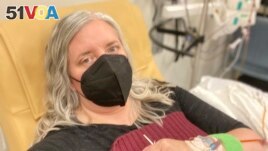16 January 2023
A British historian, an Italian archaeologist and an American teacher all have something in common.
The three women are credited with describing and naming the condition known as long COVID in early 2020.
Almost three years into the pandemic, scientists are still trying to figure out why some people get long COVID and why a small percentage — including the three women — have lasting symptoms.

This photo provided by Amy Watson of Portland, Ore., shows her during an iron infusion in December 2022. Watson, approaching 50, says she has "never had any kind of recovery" from COVID-19.(Amy Watson via AP)
Background
Rachel Pope, the historian, is from the British city of Liverpool. She posted on Twitter about her symptoms in late March 2020, after a coronavirus infection. A few months later, in Italy, Elisa Perego tweeted about her sickness also and used the term "long COVID" in the post. And, that same year, Amy Watson of Portland, Oregon, founded a Facebook support group for people, like her, who were suffering from long COVID. She identified them as "long haulers," a term used in the trucking industry. The name stuck.
Millions of people worldwide report having long COVID. The symptoms include lung damage, difficulty thinking and remembering, extreme tiredness, and other problems. Evidence suggests most people get better within a year. But recent data show that long COVID has played a part in more than 3,500 U.S. deaths.
Women more likely to suffer from long COVID
Many studies suggest that women are more likely than men to develop long COVID.
There could be biological reasons.
Women's immune systems generally have stronger reactions to viruses, bacteria, and other germs, said Sabra Klein, an immune system expert at Johns Hopkins University.
Women are also much more likely than men to have autoimmune diseases, where the body mistakenly attacks its own healthy tissue. Some scientists believe long COVID can result from an autoimmune response caused by the virus.
Women's bodies are also more likely to have more fat tissue. New research suggests the coronavirus may hide in fat after infection. Scientists also are studying whether women's changing hormone levels may increase the risks.
Yet there are other possible issues at work. Women are more likely than men to seek health care, Klein said. She added that often women are more sensitive to changes in their bodies.
"I don't think we should ignore that," she said, adding that biology and behavior are probably both at play.
Other viruses
Several studies suggest the Epstein-Barr virus could play a part in some cases of long COVID.
Epstein-Barr is a very common virus. It has infected an estimated 90 percent of the U.S. population. The virus' effects can differ greatly among those infected. Some patients might develop the disease mononucleosis, for example. Others, however, may not be sickened at all by an Epstein-Barr infection.
Inflammation caused by coronavirus infection can activate or reactivate some viruses in the body, said Dr. Timothy Henrich. He is an expert with the University of California, San Francisco.
Henrich is among researchers who have found immune markers pointing to Epstein-Barr reactivation in the blood of long COVID patients.
Not all long COVID patients have these markers. But it's possible that Epstein-Barr is causing symptoms in those who do, although scientists say more study is needed.
Obesity
Obesity is a risk factor for severe COVID-19 infections and scientists are trying to understand why.
Stanford University researchers are among those who have found evidence that the coronavirus can infect fat cells. In a recent study, they found the virus and signs of inflammation in fat tissue taken from people who had died from COVID-19.
Lab tests showed that the virus can reproduce in fat tissue. That raises the possibility that fat tissue could serve as a storage area, possibly fueling long COVID.
Hope and concerns
Dr. Lawrence Purpura is an infectious disease expert at Columbia University in New York. He said about patients with long COVID, "The majority of patients will eventually recover...It's important for people to know that."
Still, the women who helped the world recognize the condition of long COVID remain concerned about recovery.
Perego developed heart, lung and other problems and remains seriously sick.
The 44-year-old says she knows that scientists have learned a lot in a short time. But, "there is a gap," she said, between long COVID research and medical care.
Watson, who is 59, says she has "never had any kind of recovery." She experiences severe headaches, digestive trouble and nerve and foot problems. Recently she developed anemia.
She wishes the medical community had a more organized process for treating long COVID. Doctors say not knowing the underlying cause or causes makes that difficult.
"I just want my life back," Watson said, "and it's not looking like that's all that possible."
I'm Ashley Thompson. And I'm John Russell.
Lindsey Tanner reported on this study for the Associated Press. John Russell adapted it for VOA Learning English.
____
Words in This Story
symptom -- n. a change in the body or mind which indicates that a disease is present
immune -- adj. of or relating to the body's immune system
autoimmune – adj. of, relating to antibodies or T cells that attack molecules, cells, or tissues of the organism producing them
hormone – n. a natural substance that is produced in the body and that influences the way the body grows or develops
anemia – n. medical: a condition in which a person has fewer red blood cells than normal and feels very weak and tired











